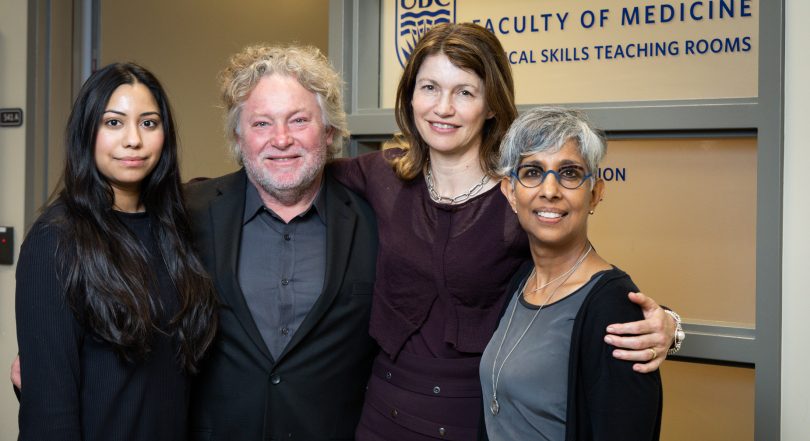Levels of burnout have increased dramatically over the past three years for many healthcare providers, including physicians. To counter this, the Department of Medicine Innovation Platform at Providence Health Care is helping physicians engage with their work and reconnect with the passion that brought them to medicine in the first place.
A 2021 paper co-authored by CHEOS-affiliated researcher Dr. Anita Palepu found that two-thirds of internal medicine specialists at Vancouver General and St. Paul’s Hospitals were experiencing symptoms of burnout during the height of the COVID-19 pandemic in 2020. The survey also found that more than 20 per cent of surveyed physicians were considering quitting the profession, or had already quit a position.
“This issue is not unique to just these two hospitals. It is widespread. I would say global,” says research lead Dr. Khan, Head, Division of General Internal Medicine at UBC, and internal medicine physician and clinical leader at St. Paul’s Hospital. “Physician burnout was already on the rise before the pandemic, but the COVID-19 pandemic tripled the odds that physicians said they felt burnout.”
Taking a systemic approach to combat burnout
If you Google “burnout” you’ll find plenty of articles that advise meditation, regular exercise and good quality sleep as possible antidotes. While these activities can help on an individual level, they don’t do anything to address the systemic problems that contribute to burnout in the first place. That’s where the PHC Department of Medicine’s Innovation Platform comes in. Launched in 2019, it’s designed to help physicians develop and implement innovative and transformational projects that are aligned with Providence Health Care’s strategic plan, as well as the St. Paul’s Hospital redevelopment plan.
“Rates of burnout are high among physicians and we realized we could help physicians get their great ideas recognized and supported,” says Dr. Kristine Chapman, Physician Lead for Innovation and Quality for the Department of Medicine. “With all the pressures on physicians today, we realized we needed to nurture innovation and create opportunities for physicians to make a difference and improve care.”
Physicians often see ways to streamline services and improve care but they are limited by the lack of time and resources to implement the necessary changes. The Innovation Platform can support physicians to write their proposal, develop a business case, identify sources of funding, and create a work plan to implement their idea.
“What we’re proving with the Innovation Platform is that counteracting burnout isn’t about doing less, but about doing things that are supportive, streamlined, and that enable you to be creative,” continues Chapman. “People go into medicine to offer great care and improve things for patients. The Innovation Platform offers physicians the opportunity to reconnect with the initial passion that brought them to medicine in the first place.”
Evaluating the Innovation Platform
In the fall of 2022, the Department of Medicine worked with the Office of Strategy and Results to evaluate the program to date. They found that physicians who had participated in the Innovation Platform, whether or not their project was chosen, had high levels of workplace engagement (88 per cent) and professional fulfillment (88 per cent). This is in sharp contrast to a Doctors of BC physician engagement survey in 2021 that found only 46 per cent of physicians in Vancouver Coastal Health and 42 per cent province-wide felt strong levels of engagement.
Showcasing innovation successes
Dr. Sara Simpson is one of the physicians benefitting from the Innovation Platform. She and her team are developing a new neuro-ophthalmology skull-based tumour clinic. They’re receiving support from the Innovation Platform to develop their program and write a business case.
“The Innovation platform has provided mentorship, resources, and financial support for me to get started on creating a clinical space that will bring together a multidisciplinary team of specialists including neurosurgery, neurology, ophthalmology and endocrinology,” says Dr. Simpson. “Our goal is to develop a new program to provide top notch clinical and patient-centred care for complex patients with skull-based tumours.”
In addition to projects early-stage projects like Dr. Simpson, the Innovation Platform can also boast several successes. For example, the SPIN clinic, launched in December 2021, was developed to streamline and better coordinate care for people with auto-immune neuromuscular diseases.
“The support and mentorship from the Innovation Platform enabled us to move the SPIN clinic from concept to reality and transform how care is delivered. The clinic is providing wrap around, multi-disciplinary care within a Value Based Health Care framework for people with autoimmune neurologic conditions,” says Dr. Katie Beadon, a PHC neurologist and co-lead for SPIN. “We were also able to launch a home-based treatment program for patients who need intravenous immunoglobulin therapy so they no longer need to spend several days a month in hospital.”





